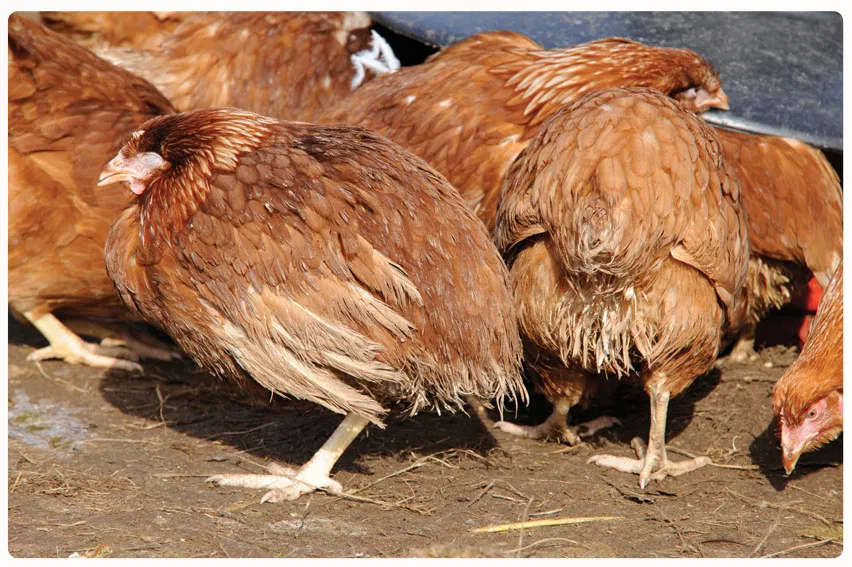What is Newcastle disease?
Newcastle disease (or some call it Mdondo) is a highly contagious avian disease that affects many species of domesticated birds such as chickens, ducks and other birds.
Newcastle disease can kill your entire flock of birds if they are not vaccinated against the disease and if an outbreak occurs, it can wipe out all the chickens in your village and even neighboring villages. Therefore, it is important to vaccinate your flock of
birds/chickens!
Symptoms of Newcastle disease vary depending on:
Virus type
Type of bird/chicken
Age and health of the bird/chicken
Environmental conditions
What area of the body was attacked by the measles virus?
Due to the reasons listed above, there are no specific symptoms of Kideri disease, but there are symptoms that you can look out for if you suspect that your chickens are suffering from Kideri disease:
Sudden deaths without showing any symptoms
Swelling of the head and neck
Green, watery diarrhea
Egg laying decreases significantly or stops completely
Tremor, head turned to one side,
Paralysis of wings and legs
Many deaths in a short period of time
However, by the time you notice the symptoms, it’s already too late! That’s why it’s recommended
to vaccinate your birds/chickens regularly.
How is Newcastle disease spread?
Newcastle disease is highly contagious and spreads to other chickens very quickly over time.
very short. The disease is spread through feces and air. It can also be spread through:
Drinking water carrying viruses
Touching food that has been contaminated with the virus
Touching sick chickens
Touching objects or products carrying the virus and sick chickens (chicken meat, intestines, eggs and feathers)
Contact with people or objects from areas affected by the disease (shoes, clothes, and car tires, all of which can carry the disease virus)
Viral chicken houses
Preventing measles through vaccination
Vaccinating your chickens against Kideri disease is the best way to prevent your chickens/birds from getting the disease. If your chickens/birds are not vaccinated, they can get Kideri disease. If they do get the disease, they cannot be treated or recovered from.
How to vaccinate your chickens/birds against Kideri disease
Get the vaccine from a reputable source. The recommended vaccine is the I-2 Newcastle vaccine. There are many manufacturers of the I-2 Newcastle vaccine using various trade names, but it is important to verify that what you are buying
is the I-2 vaccine.
-Hold the chicken firmly without leaning it to the side.
-Put one drop of the I-2 vaccine in one eye if you are vaccinating them through the eyes.
-Drop one drop into the eye and wait for the chicken to blink OR drop one drop into the nose and wait for the chicken to inhale.
Remember!
Vaccinate every three months for
chickens of ALL ages.
Vaccinate only healthy chickens. Vaccination is not
intended to treat or cure.
Avoid placing the vaccine in high temperature environments and
direct sunlight.
The I-2 Newcastle vaccine
protects chickens against
Newcastle disease only.
Feed your chickens well.
Keep the chicken house clean and germ-free at all times. The house should be well ventilated and elevated so that droppings and other waste can fall to the ground without contaminating food or water.
Place a foot-washing station at the entrance to the chicken coop to kill germs and viruses on your feet every time you enter.
Keep the chicken coop away from humans and other animals to prevent the spread of disease.
Clean chicken feeders and waterers using warm, soapy water and change food and water daily.
Other ways to control kidney disease
If your chickens are sick: Slaughter all your sick chickens as soon as possible. It is recommended to burn your sick and dead chickens to ashes or bury the dead chickens, their feathers and entrails deep in the soil.
Do not sell or give sick chickens to people, as this practice spreads the disease.
Do not vaccinate if there is already an outbreak of Kideri disease in your village. Until the last chicken dies of the disease, wait at least one month before introducing new chickens.
Reduce contact with chickens, ducks, pigeons, and pheasants
For healthy chickens, feed them corn bran, grain seeds, leaves, insects, and worms. This will help the chickens be healthy and grow faster.
Please see your veterinarian or veterinary health assistants as soon as you notice signs of illness or a decrease in egg production.





